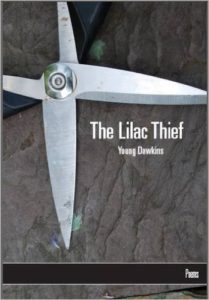The Lilac Thief
 by Young Dawkins,
by Young Dawkins,
Sargent Press, 2009,
48 pages, paper, $10.00,
ISBN: 9780615322018
Buy the Book
Reading Young Dawkins’, The Lilac Thief, feels like the struggle between remembering and understanding. As if we are walking backwards, Dawkins’ poems are both a look back and a progression. We see the dark faces of past lovers, past lives that seem disjointed and disconnected, and yet are essential for the journey we call experience.
In “What I Know About Women So Far,” the forgotten romance of routine turns into a complicated mixture of violence and sustenance: “Our sex / is like shrapnel and oranges.” Dawkins continues to work with similarly pitted images, like “spectacular train wreck marriages,” to understand the “long and dark” bodies of women who invite the narrator to
come inside and witness
the collision and drift
of ancient continents,
watch the dinosaurs die,
and be warmed by the very first fire.
And always,
and always,
the inevitable rise of civilization,
the ambitious yearning of man.
But she is in the kitchen now,
Happy with her new oil
and olives and cheese.
And I believe it has always come to this,
here
in the lowering light.
By the end of this remembering, this musing on love and sex, comfort and necessity, we are still unable to tell the difference between love and lust. As the narrator enters into new relationships with new women — “dancing / in the early / ballroom of desire” — we know love and lust exist intertwined, as separate and essentially linked as all humans seem to be.
There are moments in these poems where Dawkins, a poet from New Hampshire who generally creates in the performance and beat genres, allows his poems to struggle in their own creation. These poems waver between the sonics of beat poetry and the lyric emotion of his landscape of ex – lovers; this conflict seems to mirror the narrator’s struggle to understand his own experiences. And for all the trouble that beat, performance, and slam poets get when they try to translate their work from the stage to the page, Dawkins has succeeded.
Reading along with these poems, I forget the sound bite – driven language that often dominates the way we speak to each other today. The reward Dawkins’ poems provide is a vacation from fractured, polarized interpersonal communication. A gift of prolonged engagement, these poems invite a deeper understanding of the more intimate and complicated “collision and drift” between us all.
— Mark Rice

